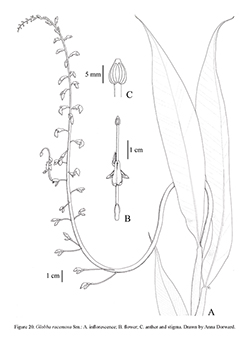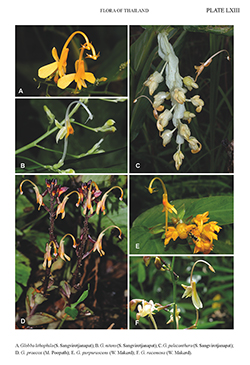e-Flora of Thailand
Volume 16 > Part 2 > Year 2023 > Page 559 > Zingiberaceae > Globba
50. Globba racemosa Sm.wfo-0000430642
Exot. Bot. 2: 115, tab. 117. 1805.— G. orixensis var. racemosa (Sm.) Gagnep., Bull. Soc. Bot. France 48: 201. 1901. Fig. 20, Plate LXIII: F.
Accepted Name : This is currently accepted.
Synonyms & Citations :
Description : Herb 0.7–1.5 m tall. Leaf sheaths ca 12, often red to maroon at base, sparsely, minutely hairy with densely hairy margins; ligule bilobed, 2–3 mm long, densely hairy; blades 8–12, elliptic, 12–30 by 3–8 cm, dark green above, dull, light green below, minutely pubescent near midrib or with bristly hairs on midrib and secondary venation above, pubescent below, plicate, base cuneate to obtuse, apex long-caudate; petiole to 3 mm. Inflorescence erect, lax, linear, 25–45 cm long; peduncle 3–12 cm, lacking sterile bracts; rachis to ca 35 cm, glabrous, green; bracts caducous, triangular to narrowly elliptic, to 1.2 cm long, thin, glabrous, green to purplish, margin hyaline; cincinni 1–3 cm to first flower, flowers crowded at tip, green; bracteoles as bracts but proportionately smaller. Flower: ovary narrowly ellipsoid, 1.5–3 by 1.5 mm, glabrous, dark purple; calyx narrowly funnel-shaped, 8–9 mm, glabrous, apex trilobed; floral tube 1.4–1.9 cm beyond calyx, red-brown, glabrous, dorsal corolla lobe hooded, elliptic, 8–9 by 3–3.5 mm, short mucronate at tip, orange-brown or reddish brown, lateral corolla lobes ovate to triangular, ca 7 by 3 mm, flat, orange-brown or reddish brown; lateral staminodes narrowly ovate, ca 7 by 3 mm, apex acute, equal to corolla lobes, yellow; labellum broadly obtriangular, (1.4–)1.5–1.7 by 0.7 cm, shallowly bilobed, lobes acute, considerably longer than corolla lobes, brownish yellow with darker patch at centre, often red around opening to corolla tube; stamen: filament 1.5–2 cm beyond labellum, whitish purple; anther elliptic, ca 5 by 2.5 mm; connective tissue yellow, appendages lacking. Fruit globose to ellipsoid, to 2 by 1.2 cm, verrucose, green. Bulbils fusiform, ca 1 by 0.4 cm, bamboo-like, produced in upper part of inflorescence and peduncle.
Thailand : NORTHERN: Mae Hong Son (Wat Mae Ho), Chiang Mai (Chang Khian, Doi Chiang Dao, Doi Inthanon, Omkoi, Mae Rim), Phayao (Chiang Kham), Nan (Bo Kluea, Doi Phu Kha), Lamphun (Doi Khun Tan), Lampang (Chae Son), Tak (Lan Sang NP, Umphang); NORTH-EASTERN: Loei (Phu Luang).
Distribution : Bhutan, China, India, Laos, Myanmar, Nepal (Kathmandu – type), Vietnam.
Ecology : Locally common in highland forests, 700–2,000 m alt.
Vernacular : Khamin phi (ขมิ้นผี).
Notes: This species is common in high mountains in North and North-Eastern Thailand. The occurrence of bulbils at tip of the inflorescence is a highly diagnostic character.


